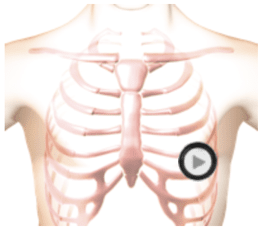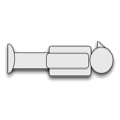Fourth Heart Sound Gallop Auscultation Lesson with Recordings
Virtual Auscultation


The patient's position is supine.
Lesson
The fourth heart sound occurs in late diastole just prior to the first heart sound. The first heart sound is decreased in intensity and the second heart sound is increased in intensity. The fourth heart sound is produced by an increase in stiffness of the left ventricle due to scar tissue formation. This may be a manifestation of coronary heart disease. A fourth heart sound can also be caused by a greatly thickened left ventricular wall such as with essential hypertension or aortic stenosis. This is shown in the anatomy video. A fourth heart sound is never heard with atrial fibrillation because the contraction of the atria is ineffective in this condition. The fourth heart sound is a low frequency sound best heard with the bell of the stethoscope pressed lightly on the skin of the chest.Waveform
Heart Sounds Video
Authors and Sources
Authors and Reviewers
-
Heart sounds by Dr. Jonathan Keroes, MD and David Lieberman, Developer, Virtual Cardiac Patient.
- Lung sounds by Diane Wrigley, PA
- Respiratory cases: William French
-
David Lieberman, Audio Engineering
-
Heart sounds mentorship by W. Proctor Harvey, MD
- Special thanks for the medical mentorship of Dr. Raymond Murphy
- Reviewed by Dr. Barbara Erickson, PhD, RN, CCRN.
-
Last Update: 12/11/2022
Sources
-
Heart and Lung Sounds Reference Library
Diane S. Wrigley
Publisher: PESI -
Impact Patient Care: Key Physical Assessment Strategies and the Underlying Pathophysiology
Diane S Wrigley & Rosale Lobo - Practical Clinical Skills: Lung Sounds
- Essential Lung Sounds
Diane S. Wrigley, PA-C
Published by MedEdu LLC - PESI Faculty - Diane S Wrigley
-
Case Profiles in Respiratory Care 3rd Ed, 2019
William A.French
Published by Delmar Cengage - Essential Lung Sounds
by William A. French
Published by Cengage Learning, 2011 - Understanding Lung Sounds
Steven Lehrer, MD
- Clinical Heart Disease
W Proctor Harvey, MD
Clinical Heart Disease
Laennec Publishing; 1st edition (January 1, 2009)